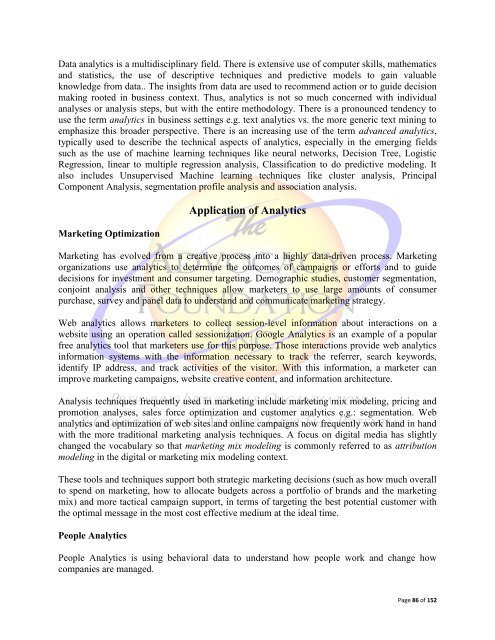Nonprofit Marketing
Nonprofit Marketing
Nonprofit Marketing
You also want an ePaper? Increase the reach of your titles
YUMPU automatically turns print PDFs into web optimized ePapers that Google loves.
Data analytics is a multidisciplinary field. There is extensive use of computer skills, mathematics<br />
and statistics, the use of descriptive techniques and predictive models to gain valuable<br />
knowledge from data.. The insights from data are used to recommend action or to guide decision<br />
making rooted in business context. Thus, analytics is not so much concerned with individual<br />
analyses or analysis steps, but with the entire methodology. There is a pronounced tendency to<br />
use the term analytics in business settings e.g. text analytics vs. the more generic text mining to<br />
emphasize this broader perspective. There is an increasing use of the term advanced analytics,<br />
typically used to describe the technical aspects of analytics, especially in the emerging fields<br />
such as the use of machine learning techniques like neural networks, Decision Tree, Logistic<br />
Regression, linear to multiple regression analysis, Classification to do predictive modeling. It<br />
also includes Unsupervised Machine learning techniques like cluster analysis, Principal<br />
Component Analysis, segmentation profile analysis and association analysis.<br />
<strong>Marketing</strong> Optimization<br />
Application of Analytics<br />
<strong>Marketing</strong> has evolved from a creative process into a highly data-driven process. <strong>Marketing</strong><br />
organizations use analytics to determine the outcomes of campaigns or efforts and to guide<br />
decisions for investment and consumer targeting. Demographic studies, customer segmentation,<br />
conjoint analysis and other techniques allow marketers to use large amounts of consumer<br />
purchase, survey and panel data to understand and communicate marketing strategy.<br />
Web analytics allows marketers to collect session-level information about interactions on a<br />
website using an operation called sessionization. Google Analytics is an example of a popular<br />
free analytics tool that marketers use for this purpose. Those interactions provide web analytics<br />
information systems with the information necessary to track the referrer, search keywords,<br />
identify IP address, and track activities of the visitor. With this information, a marketer can<br />
improve marketing campaigns, website creative content, and information architecture.<br />
Analysis techniques frequently used in marketing include marketing mix modeling, pricing and<br />
promotion analyses, sales force optimization and customer analytics e.g.: segmentation. Web<br />
analytics and optimization of web sites and online campaigns now frequently work hand in hand<br />
with the more traditional marketing analysis techniques. A focus on digital media has slightly<br />
changed the vocabulary so that marketing mix modeling is commonly referred to as attribution<br />
modeling in the digital or marketing mix modeling context.<br />
These tools and techniques support both strategic marketing decisions (such as how much overall<br />
to spend on marketing, how to allocate budgets across a portfolio of brands and the marketing<br />
mix) and more tactical campaign support, in terms of targeting the best potential customer with<br />
the optimal message in the most cost effective medium at the ideal time.<br />
People Analytics<br />
People Analytics is using behavioral data to understand how people work and change how<br />
companies are managed.<br />
Page 86 of 152

















